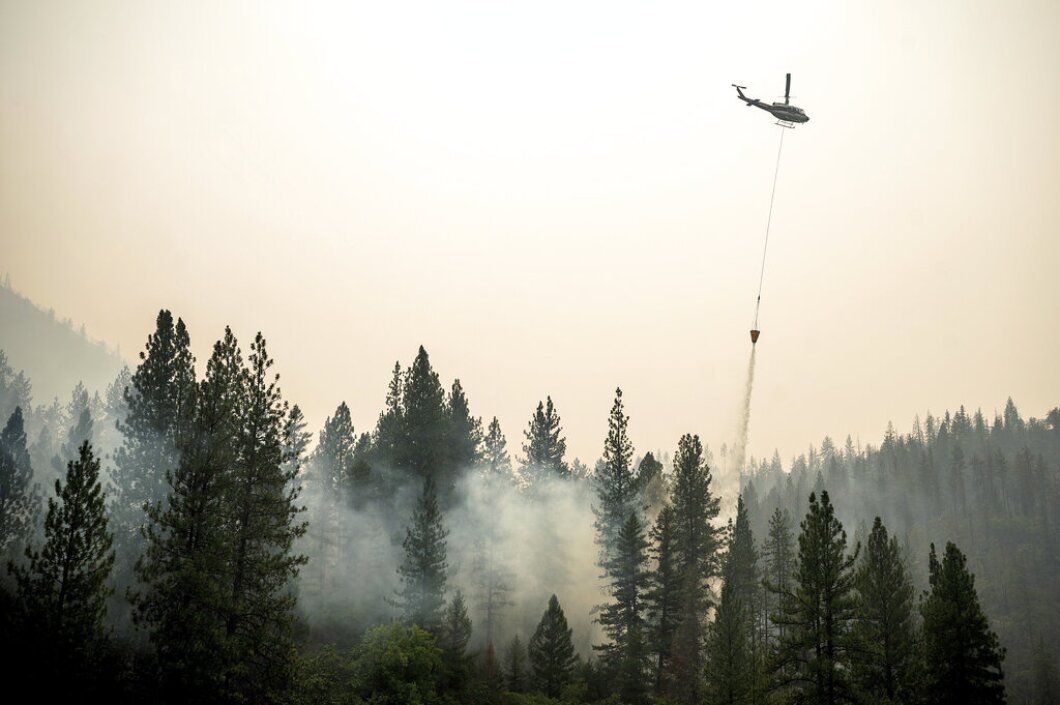
KLAMATH RIVER, California — Firefighters have gotten their first hold on California’s deadliest and most destructive fire of the year and expected that the blaze would remain stalled through the weekend.
The McKinney Fire near the Oregon border was 10% contained as of Wednesday night, and bulldozers and hand crews were making progress carving firebreaks around much of the rest of the blaze, fire officials said at a community meeting.
The southeastern corner of the blaze above the Siskiyou County seat of Yreka, which has about 7,800 residents, was contained. Evacuation orders for sections of the town and Hawkinsville were downgraded to warnings, allowing people to return home but with a warning that the situation remained dangerous.
About 1,300 residents remained under evacuation orders, officials said.
The fire didn’t advance on Wednesday, following several days of brief but heavy rain from thunderstorms that provided cloudy, damper weather.
“This is a sleeping giant right now,” said Darryl Laws, a unified incident commander on the blaze.
In addition, firefighters expected Thursday to fully surround a 1,000-acre spot fire on the northern edge of the McKinney Fire.
The fire broke out last Friday and has charred nearly 90 square miles of forestland left tinder-dry by drought. More than 100 homes and other buildings have burned, and four bodies have been found, including two in a burned car in a driveway.

The blaze was driven at first by fierce winds ahead of a thunderstorm cell. More storms earlier this week proved a mixed blessing. A drenching rain Tuesday dumped up to 3 inches on some eastern sections of the blaze, but most of the fire area got next to nothing, said Dennis Burns, a fire behavior analyst.
The latest storm also brought concerns about possible river flooding and mudslides. A private contractor in a pickup truck who was aiding the firefighting effort was hurt when a bridge gave out and washed away the vehicle, Courtney Kreider, a spokeswoman with the Siskiyou County Sheriff’s Office, said, noting that the contractor had non-life-threatening injuries.
However, no weather events were forecast for the next three or four days that could give the fire “legs,” Burns said.
The good news came too late for many people in the scenic hamlet of Klamath River, which was home to about 200 people before the fire reduced many of the homes to ashes, along with the post office, community center, and other buildings.
At an evacuation center Wednesday, Bill Simms said three of the four victims were his neighbors. Two were a married couple who lived up the road.
“I don’t get emotional about stuff and material things,” Simms said. “But when you hear my next-door neighbors died … that gets a little emotional.”
Their names haven’t been confirmed, and it could take several days to do so, Kreider said.
Simms, a 65-year-old retiree, bought his property six years ago as a second home with access to hunting and fishing. He went back to check on his property Tuesday and found it was destroyed.
“The house, the guest house, and the RV were gone. It’s just wasteland, devastation,” Simms said. He found the body of one of his two cats, which he buried. The other cat is still missing. He was able to take his two dogs with him to the shelter.
Harlene Schwander, 82, lost the home she had just moved into a month ago to be closer to her son and daughter-in-law. Their home survived, but her house was torched.
Schwander, an artist, said she only managed to grab a few family photos and some jewelry before evacuating. Everything else, including her art collection, went up in flames.
“I’m sad. Everybody says it was just stuff, but it was all I had,” she said.
California and much of the rest of the West are in drought, and wildfire danger is high, with the historically worst of the fire season still to come. Fires are burning in Montana, Idaho, and Nebraska and have destroyed homes and threaten communities.
Scientists say climate change has made the West warmer and drier over the last three decades and will continue to make weather more extreme and wildfires more frequent and destructive. California has seen its largest, most destructive, and deadliest wildfires in the last five years. In 2018, a massive blaze in the Sierra Nevada foothills destroyed much of the city of Paradise and killed 85 people, the most deaths from a U.S. wildfire in a century.
In northwestern Montana, a fire that has destroyed at least four homes and forced the evacuation of about 150 residences west of Flathead Lake continued to be pushed north by winds on Wednesday, fire officials said.
Crews had to be pulled off the lines on Wednesday afternoon due to increased fire activity, Sara Rouse, a public information officer, told NBC Montana.
There were concerns the fire could reach Lake Mary Ronan by Wednesday evening, officials said.
The fire, which started on July 29 in grass on the Flathead Indian Reservation, quickly moved into timber and charred nearly 29 square miles.
CLICK HERE TO READ MORE FROM THE WASHINGTON EXAMINER
The Moose Fire in Idaho has burned more than 85 square miles in the Salmon-Challis National Forest while threatening homes, mining operations, and fisheries near the town of Salmon.
And a wildfire in northwestern Nebraska led to evacuations and destroyed or damaged several homes near the small city of Gering. The Carter Canyon Fire began Saturday as two separate fires that merged.







